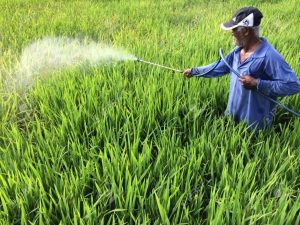
In 2018, the Indian pesticides market was valued at INR 197 billion. The demand is expected to hit INR 316 billion by 2024, rising at an annual rate of 8.1 percent from 2019 to 2024. Pesticides are compounds or mixtures of substances used to deter, degrade, repel, or minimise the existence of pests.
Pesticides are the final input in an agricultural process, and they are used to avoid seed spoilage by pests such as mosquitoes, fungi, weeds, and other organisms, thus increasing agricultural production. Pesticides have been increasingly important in recent decades, driven by the need to improve overall agricultural productivity and ensure sufficient food supply for the country’s rapidly growing population. Pests and diseases consume approximately 20-25 percent of the total food produced in India.
Related Projects: – Disinfectants, Pesticides, Insecticides, Mosquito Repellents, Destroyers
Indian Pesticide Market: Drivers
As a result of rising urbanisation, overall available arable land per capita has been decreasing in recent years and is projected to continue to decline in the coming years. Food demand is projected to continue to increase in the coming years, owing to increasing population levels. Pesticides are expected to play a significant role in growing average crop yields per hectare.
Related Book: The Complete Technology Book on Pesticides, Insecticides, Fungicides, and Herbicides with Formulae & Processes
The pesticides industry is projected to benefit greatly from government policies to provide credit to farmers in rural areas. Farmers are more likely to use more pesticides to increase crop yields as farm loans become more widely available and have lower interest rates.
Pesticides are the final input in an agricultural process, and they are used to avoid seed spoilage by pests such as mosquitoes, fungi, weeds, and other organisms, thus increasing agricultural production. Pesticides have been increasingly important in recent decades, driven by the need to improve overall agricultural productivity and ensure sufficient food supply for the country’s rapidly growing population. Pests and diseases consume approximately 20-25 percent of the total food produced in India.
Farmers are becoming more mindful of pesticides as a result of both government and private programmes. In various parts of the world, farmers are being educated on the proper use of pesticides in terms of quantity, application technique, and suitable chemicals to use for known pest problems, among other things.
Related Books: – Agrochemicals, Pesticides, Insecticides, Fungicides, Herbicides, Biofertilizer, Vermicompost Manufacturing
Growing Need for Enhancing Agricultural Productivity
India is primarily an agrarian economy, with agriculture providing a living for more than half of the population. Agriculture’s contribution to the country’s economy, on the other hand, has been declining in recent years.
The explanation for this is that crop yields in India are much smaller than in other parts of the world, like North America, Europe, and even related countries like China. In 2016, the country’s average yield of food grains was 2.99 metric tonnes per hectare, while the global average was 3.97 metric tonnes per hectare.
Crop protection chemical demand is projected to grow at a rapid pace over the forecast period, driven by the need to raise crop yields.
Increase in Adoption of Biopesticides
Biopesticides are becoming more common in Indis because they are essentially less toxic (as compared to regular synthetic pesticides). Biopesticides usually impact only the target plant and closely associated species, as opposed to broad-spectrum conventional pesticides, which may hurt other organisms. The Indian government has introduced Integrated Pest Management Practices (IPM), with a focus on the use of bio-pesticides and plant-based pesticides such as Neem formulations. Major agrochemical firms are involved in research and development to introduce new biological products to Indian farmers.
Competitive Environment
The crop defence chemicals industry in India is fiercely competitive, with major players such as Bayer AG, UPL Limited, and BASF SE, all of which are owned by Rallies India Limited, commanding a large share of the market. The key tactics used by these industry players include new product releases, mergers and acquisitions, and alliances. In order to grow their market share, these businesses are also focused on engaging in technologies, partnerships, and expansions.
Related Video: – Manufacturing Processes for Production of Pesticides, Insecticides, Fungicides and Herbicides
Government Regulations
- The Insecticides Act – 1968
- The Environment Protection Act – 1986
- The Bureau of Indian Standards Act
- Hazardous Waste Management & Handling Rules – 1989
NIIR PROJECT CONSULTANCY SERVICES (NIIR) sets the standard for integrated Consultancy services. Our belief in open communication and partnership, which is at the heart of everything we do, helps us in providing our clients with best of the knowledge and business insights that can help them attain their individual business goals.
PM_Art2021